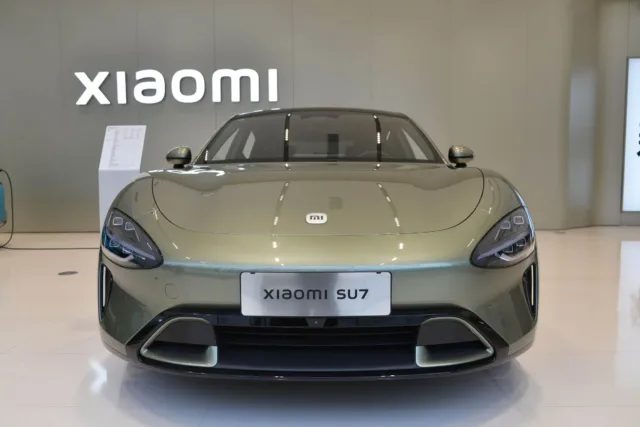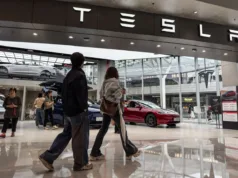TLDR
- Xiaomi sold 48,654 electric vehicles in China during October 2025, outselling Tesla’s 26,006 units for the first time
- Tesla’s October sales dropped to their lowest level in three years as Chinese consumers shifted to local brands
- Xiaomi’s SU7 sedan and YU7 SUV gained traction through competitive pricing and tech integration with the company’s smartphone ecosystem
- China’s overall EV market cooled in October after government subsidies expired, with top seller BYD seeing a 12% year-on-year decline
- Xiaomi shares jumped 4% to HK$44.62 following the China Passenger Car Association sales data release
Get live prices, charts, and KO Scores from KnockoutStocks.com, the data-driven platform ranking every stock by quality and breakout potential.
Xiaomi shares climbed 4% to HK$44.62 on Wednesday after official data showed the company sold more electric vehicles than Tesla in China during October. The numbers mark a turning point for the smartphone maker’s automotive ambitions.

The China Passenger Car Association reported Xiaomi delivered 48,654 units of its SU7 sedan and YU7 SUV combined in October. Tesla sold 26,006 vehicles in the same period. This was Tesla’s weakest monthly performance in China in three years.
Xiaomi launched its first car, the SU7 sedan, in 2024. The company followed with the YU7 SUV in 2025. Both models target the same market segment as Tesla’s Model Y and Model X.
The electronics maker brought its smartphone playbook to the car business. It integrated vehicle controls with existing Xiaomi phones and home devices. Software updates roll out like phone updates. Pricing came in below many competitors while packing tech features.
Price Cuts Failed to Help Tesla
Tesla tried cutting prices and updating its aging vehicle lineup in China. The moves did not stop the sales slide. Chinese buyers have shifted toward local brands that offer better value and understand local preferences.
Tesla’s market share dropped enough to push the company out of the top ten in monthly new energy vehicle retail rankings. The automaker increased exports from its Shanghai factory in October. This masked some of the domestic weakness.
Chinese consumers now prioritize price, features and after-sales service networks. Foreign brands face tougher competition as local players match or exceed quality standards. Trust in domestic brands has grown.
China EV Market Cools Overall
China’s total automobile sales weakened in October. Several government subsidies and purchase incentives expired with no replacement programs announced. Beijing pulled back some support programs it viewed as overheating the market.
Even BYD, China’s largest EV maker, saw October sales fall 12% compared to the previous year. The cooling affected most players. Xiaomi’s growth stood out against this backdrop.
The company’s October numbers set a new monthly record. This showed strength in a market where others struggled. Xiaomi’s two models compete directly with established players on features and price.
Xiaomi used its supply chain expertise from electronics manufacturing. The company built factory partnerships quickly. It applied cost efficiencies learned from phone production to car making.
Digital marketing and strong preorder campaigns helped build momentum. The brand’s existing customer base provided a ready pool of potential buyers. Many Xiaomi phone users wanted cars that connected to their devices.
Production ramped faster than many analysts expected. Local manufacturing and government support for domestic EV makers helped scale deliveries. The company avoided some supply chain issues that hit competitors.
Stock Market Response
Xiaomi shares gained as much as 4% in Hong Kong trading. The stock helped push the Hang Seng index up 0.5% for the day. Investors had been watching monthly delivery numbers closely since the car launch.
The company faces questions about profit margins. Building cars at scale typically squeezes margins in early years. Xiaomi must balance growth with financial returns.
Production risks remain. Any safety incidents or quality problems could damage the brand. Tougher regulations on new automakers could slow expansion plans.
Consumer demand may soften as subsidies fade across China. Competition will intensify as established automakers respond. Tesla and others will likely adjust pricing and features.
Xiaomi’s ecosystem approach gives it an edge. Buyers get cars that work seamlessly with devices they already own. This lock-in effect could drive repeat purchases and loyalty.
The October sales data from the China Passenger Car Association showed Xiaomi delivered 48,654 vehicles while Tesla sold 26,006 units in the Chinese market.








